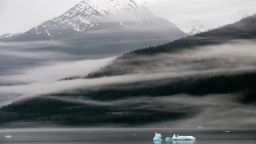Federal protections for Alaska’s Tongass National Forest will be lifted this week by the Trump administration, allowing “logging and other forms of development” to occur in the world’s largest intact temperate rainforest known as America’s Amazon, The Washington Post reported Wednesday.
“As of Thursday, it will be legal for logging companies to build roads and cut and remove timber throughout more than 9.3 million acres of forest,” the Post said.
The newspaper, which noted that the federal protections were put in place in 2001 during the waning days of Bill Clinton’s presidency, said the rollback by President Donald Trump represents “one of the most sweeping public lands rollbacks” Trump has made during his tenure. The President previously removed acreage from two national monuments and worked to open more federal lands and waters to oil drilling and mining.
The forest – about the size of West Virginia – and region form the world’s largest intact temperate rainforest. The area is a vibrant habitat for bear, eagle and salmon, plus towering old-growth cedar, hemlock and spruce. It includes Alaska’s capital, Juneau, and 31 other communities.
The area also features “old-growth stands of red and yellow cedar, Sitka spruce and Western hemlock,” according to the Post, which said some of the trees “are between 300 and 1,000 years old (and) absorb at least 8 percent of all the carbon stored in the entire Lower 48′s forests combined.”
Dominick DellaSala, the chief scientist with the Earth Island Institute’s Wild Heritage project, told the Post that although “tropical rainforests are the lungs of the planet, the Tongass is the lungs of North America,” adding that the forest is “America’s last climate sanctuary.”
Environmentalists plan to mount a legal challenge to the rollback, according to the Post, which said advocates have successfully protected the forest since the 1970s.
“There’s never been a strong economic argument for logging, and neither has there been a strong biological or cultural argument. And we’re confident we’ll continue to prevail in the courts,” Sam Sankar, the vice president for programs at Earthjustice, told the newspaper.
Both supporters and opponents of the rollback say it has important economic implications.

Robert Venables, the executive director of the Southeast Conference, told the Post that Alaska’s economy “is collapsing” amid the coronavirus pandemic, so the rollback might allow loggers to access timber from the area.
“There’s some common-sense, near-term relief,” he said, according to the newspaper.
But all five of Alaska’s native tribal nations have opposed the action, going so far as to recently withdraw as cooperating agencies in the process after the US Forest Service published a blueprint for opening up the entire forest for development, the Post said.
In an interview with the newspaper, Marina Anderson, the tribal administrator for the Organized Village of Kasaan on Prince of Wales Island, said “tribal officials oppose extensive logging because old-growth trees help lower stream temperatures and provide key wildlife habitat,” which the village relies on for food.
“It will only devastate even more what is already in progress,” Anderson told the Post.
CNN’s Gregory Wallace contributed to this report.


